Activity Reports:Japanese Studies and Intellectual Exchange:Report on Symposium "Children for the Future, Future of the Children --Child Policies and the Role of Civil Society in a Time of the Economic Crisis"
Ai Goto
Europe, Middle East, and Africa Division
Japanese Studies & Intellectual Exchange Department
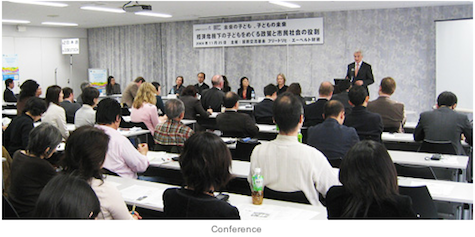
The Japan Foundation (JF) and the Friedrich Ebert Stiftung (FES) hosted an international symposium "Children for the Future, Future of the Children --Child Policies and the Role of Civil Society in a Time of the Economic Crisis".
In their opening addresses, both Tsuyoshi Takahashi (JF) and Sven Saaler (Sophia University/FES) referred to the theme of the conference: "Children for the Future - Future of the Children". They drew particular attention to the fact that even industrialized countries such as Japan and Germany have an increasing number of children living below the respective poverty lines. The economic crisis has strengthened this trend in both countries. Government policies, however, do not always sufficiently take into account the interests of the children. Takahashi ended the remarks by expressing the hope that Japan and Germany learn from and support each other in their striving to ensure a secure future for the children of both countries.
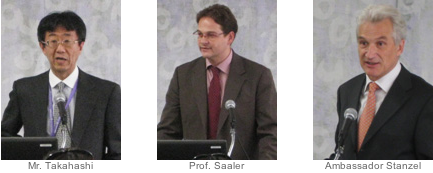
Session 1: Social Policies Concerning Children & Families
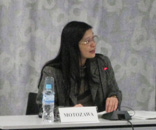 Moderator: Professor Miyoko Motozawa, Tsukuba University
Moderator: Professor Miyoko Motozawa, Tsukuba University
Martina Peucker (German Federal Ministry for Families, Senior Citizens and Youth): Recent developments in German family and child policy
After a brief summary of the economic background, Peucker explained that, according to a survey conducted in summer of 2009, about one third of all working persons have been directly affected by the economic crisis. In the same survey it was found that state support for families with children was considered necessary by the majority, demonstrating that child and family policies play a pivotal role in society. Therefore, the federal government and the regional governments have agreed to invest one tenth of Germany's GDP in education and research until the year 2015 with the main objective to promote preschool education as a key to success in education. A central focus of current child and family policies, Peucker explained, is the increase of daycare facilities, but also the improvement of quality of these institutions. These measures are aiming at guaranteeing equal opportunities in early education for all children and improving work-life-balance of parents. Peucker also referred to the exacerbated situation with regard to child abuse and explained the steps already taken by the federal and state governments with regards to more active child protection measures, such as the federal government's action plan "Early Help" as well as the Child Protection Law. Within this context, the federal government's action plan to protect children and youths from sexual violence as well as the international activities of the federal government were mentioned. Finally, Peucker presented the federal government's initiative "Strengthening Youth", which is aiming at providing support for socially disadvantaged families and young people from immigrant families in particular, and the action plan "Multiple Generations House", aiming at fostering cooperation and communication among generations.
Tomoaki Asakawa (Ministry of Health, Labour and Welfare): Recent Developments in Family and Children Policies in Japan
 In his presentation, Asakawa primarily addressed the problem of Japan's low birth rate. In the long run, this also has an adverse effect on Japan's economic strength, as the number of working people as a percentage of the population is steadily decreasing. Younger women, in particular, either tend to delay marriage for as long as possible or reject it outright, leading to fewer children being born. As an important point, Asakawa mentioned the fact that extremely long working hours in Japan make it practically impossible to combine children with a career. As permanent job appointments have also become few in Japan, it is also becoming increasingly difficult for young men and women to create the financial framework required for marrying and having children. He wrapped up his presentation by stating that it is necessary to realize a well-functioning work-life balance at individual working environments, accompanied by government policies to support young families.
In his presentation, Asakawa primarily addressed the problem of Japan's low birth rate. In the long run, this also has an adverse effect on Japan's economic strength, as the number of working people as a percentage of the population is steadily decreasing. Younger women, in particular, either tend to delay marriage for as long as possible or reject it outright, leading to fewer children being born. As an important point, Asakawa mentioned the fact that extremely long working hours in Japan make it practically impossible to combine children with a career. As permanent job appointments have also become few in Japan, it is also becoming increasingly difficult for young men and women to create the financial framework required for marrying and having children. He wrapped up his presentation by stating that it is necessary to realize a well-functioning work-life balance at individual working environments, accompanied by government policies to support young families.
Sawako Shirahase (University of Tokyo): Poverty among Families with Children in International Comparison
 Shirahase made the presentation focusing on the welfare of children, mainly because Japanese society and policies have lately concentrated mainly on senior citizens, with child poverty only recently becoming a subject for discussion. She emphasized that, in times of crisis, families with children are particularly affected, i.e. both higher-income and lower-income families. One of the main reasons for this is that higher-income families are - on average - investing more money in the education of their children and thus feel the financial burden as much as families with a lower income. Young families and single parents are particularly affected, as are the so-called working poor, i.e. those who have employment, but whose income is insufficient to support a family. As an approach to finding a solution, Shirahase suggested that low-income families should receive support such as child benefits, while middle- and higher-income families could be supported by means of tax relief.
Shirahase made the presentation focusing on the welfare of children, mainly because Japanese society and policies have lately concentrated mainly on senior citizens, with child poverty only recently becoming a subject for discussion. She emphasized that, in times of crisis, families with children are particularly affected, i.e. both higher-income and lower-income families. One of the main reasons for this is that higher-income families are - on average - investing more money in the education of their children and thus feel the financial burden as much as families with a lower income. Young families and single parents are particularly affected, as are the so-called working poor, i.e. those who have employment, but whose income is insufficient to support a family. As an approach to finding a solution, Shirahase suggested that low-income families should receive support such as child benefits, while middle- and higher-income families could be supported by means of tax relief.
Masako Maeda (Yokohama Association for International Communications and Exchanges, former Deputy Mayor of Yokohama): "Which is More Important for Children: Monetary or Societal Support? Policy Priorities under Limited Resources"
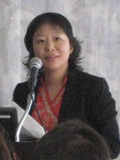 Based on her experience as Deputy Mayor of Yokohama, Maeda stressed that financial assistance alone is not sufficient to help children and families. Fewer interpersonal relations and rising unemployment are resulting in social alienation, especially among young mothers, fueling their fear and loneliness. As a result, the number of child abuse cases is on the rise. She said that the work of social workers and counseling services should become as important as meeting the physical needs of families with children and reaffirming the significance of networking with society.
Based on her experience as Deputy Mayor of Yokohama, Maeda stressed that financial assistance alone is not sufficient to help children and families. Fewer interpersonal relations and rising unemployment are resulting in social alienation, especially among young mothers, fueling their fear and loneliness. As a result, the number of child abuse cases is on the rise. She said that the work of social workers and counseling services should become as important as meeting the physical needs of families with children and reaffirming the significance of networking with society.
Antje Richter-Kornweitz (Landesvereinigung für Gesundheit und Akademie für Sozialmedizin Niedersachsen): "Child Poverty in Germany and the Consequences for Health, Education and Participation: Policy Recommendations for a Better Future of all Children"
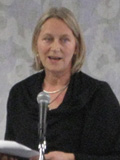 On the issue of growing child poverty in Germany, Richter-Kornweitz pointed out that inequality affected the socially disadvantaged in two aspects - education and health. One problem impeding equal access to education and health is the compartmentalized public administration. She called for a more comprehensive approach and urged the federal and state governments to make concerted efforts to establish a framework so children in poverty can be more integrated into society, instead of being blamed for their problems.
On the issue of growing child poverty in Germany, Richter-Kornweitz pointed out that inequality affected the socially disadvantaged in two aspects - education and health. One problem impeding equal access to education and health is the compartmentalized public administration. She called for a more comprehensive approach and urged the federal and state governments to make concerted efforts to establish a framework so children in poverty can be more integrated into society, instead of being blamed for their problems.
Session 2: Changing Roles of Parental Involvement and Civil Society
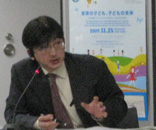 Moderator: Michiaki Sato (Asahi Shimbun)
Moderator: Michiaki Sato (Asahi Shimbun)
Tetsuya Ando (NGO Fathering Japan): "Smiling Fathers will Change the World: When Fathers Become True Citizens"
 Ando switched careers from company employee to chief representative of NGO Fathering Japan several years ago, and since then has spearheaded efforts to facilitate young fathers' participation in childrearing. He introduced some group's activities, seminars, workshops, and debate sessions to explain their benefits to families. Fathers joining these programs understand their expected roles within their families and share their concerns and problems with peers. He argued against the general view that longer working hours deprived fathers of quality time with families. He learned how to work efficiency when he was a corporate manager. This efficiency is the key to creating more spare time, improving relations with spouses and making family bonds stronger, he stressed. To this end, he not only called for changes in awareness of the government, businesses and social environment but also stressed the significance of the effort taken by each and every one us at home.
Ando switched careers from company employee to chief representative of NGO Fathering Japan several years ago, and since then has spearheaded efforts to facilitate young fathers' participation in childrearing. He introduced some group's activities, seminars, workshops, and debate sessions to explain their benefits to families. Fathers joining these programs understand their expected roles within their families and share their concerns and problems with peers. He argued against the general view that longer working hours deprived fathers of quality time with families. He learned how to work efficiency when he was a corporate manager. This efficiency is the key to creating more spare time, improving relations with spouses and making family bonds stronger, he stressed. To this end, he not only called for changes in awareness of the government, businesses and social environment but also stressed the significance of the effort taken by each and every one us at home.
Heinz Hilgers (President, Federal League for Child Protection, Germany, and former Mayor of Dormagen): "Children Poverty and Children Policies in Germany: The Role of Civil Society"
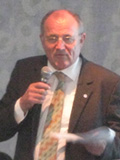 Following a report on child poverty in Germany and a brief introduction to the German Federal League for Child Protection, the focal point of the discussion was the presentation of the project "As early as possible: planning integration", which Hilgers has started in the city of Dormagen. The aim of the project is especially to support families with children. Hilgers screened a short film to demonstrate how young and frequently overburdened families in Dormagen are being provided with the means to help themselves. Hilgers also emphasized the importance of "good examples", which often have more effect than mere legislative changes.
Following a report on child poverty in Germany and a brief introduction to the German Federal League for Child Protection, the focal point of the discussion was the presentation of the project "As early as possible: planning integration", which Hilgers has started in the city of Dormagen. The aim of the project is especially to support families with children. Hilgers screened a short film to demonstrate how young and frequently overburdened families in Dormagen are being provided with the means to help themselves. Hilgers also emphasized the importance of "good examples", which often have more effect than mere legislative changes.
Axel Klein (German Institute for Japanese Studies): Family Policies and Low Fertility Rate in Germany and Japan: A Comparative Perspective
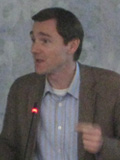 In his presentation, Klein expressed his opinion that policies in Japan are far less aimed at the welfare of children than in Germany. As an important reason he mentioned that the subject of fertility would not be one with which to win an election in Japan. Politicians are also not often personally affected by the problem, rendering this topic even less popular. Unlike in Germany, stakeholders such as welfare associations, churches or the Federal Constitutional Court hardly exert influence on politics in Japan; consequently insufficient pressure is being exerted on political decision-makers. As a result, very little has happened to date in the political arena, with Klein emphasizing that this might change as a result of the recent government change.
In his presentation, Klein expressed his opinion that policies in Japan are far less aimed at the welfare of children than in Germany. As an important reason he mentioned that the subject of fertility would not be one with which to win an election in Japan. Politicians are also not often personally affected by the problem, rendering this topic even less popular. Unlike in Germany, stakeholders such as welfare associations, churches or the Federal Constitutional Court hardly exert influence on politics in Japan; consequently insufficient pressure is being exerted on political decision-makers. As a result, very little has happened to date in the political arena, with Klein emphasizing that this might change as a result of the recent government change.
Session 3: Panel Discussion: What should be done for our future?
Moderator: Michiaki Sato (Asahi Shimbun)
Panelists: Tetsuya Ando, Sawako Shirahase, Masako Maeda, Heinz Hilgers, Martina Peucker, Antje Richter-Kornweitz
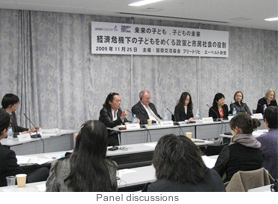 Asked by an audience about Japanese election campaigns focusing more on the elderly than children or youth, Hilgers replied that though some politicians in Germany were increasingly inclined to take a similar stance, the vast majority of the elderly attached more importance to the future of children. Therefore, in principle, the elderly and children should be on the same side. In response to comments from the floor that Japanese fathers need to learn to work more efficiently so that they can shorten working hours and help with childrearing, Ando said that many fathers struggle to balance work and life because the weight of work is heavier than they expected, while some still cannot understand the importance of the father's role. He added that given that men's awareness is changing to become more family oriented, especially among those in twenties, he expects the situation to be improved. Panelists and participants continued to have informative discussions.
Asked by an audience about Japanese election campaigns focusing more on the elderly than children or youth, Hilgers replied that though some politicians in Germany were increasingly inclined to take a similar stance, the vast majority of the elderly attached more importance to the future of children. Therefore, in principle, the elderly and children should be on the same side. In response to comments from the floor that Japanese fathers need to learn to work more efficiently so that they can shorten working hours and help with childrearing, Ando said that many fathers struggle to balance work and life because the weight of work is heavier than they expected, while some still cannot understand the importance of the father's role. He added that given that men's awareness is changing to become more family oriented, especially among those in twenties, he expects the situation to be improved. Panelists and participants continued to have informative discussions.
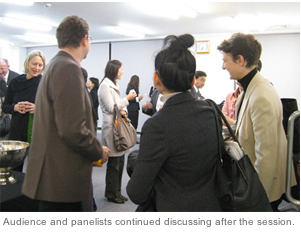
45% of participants (23 people) responded to the evaluation questionnaire sheet. Over a half (65%) of respondents' reason of attending was being "interested in the topic", more precisely in "child-rearing support", "role of civil society", "family policies in Germany" and "father's participation in child-rearing". Others attended for the symposium because of their "interest in speakers", "interested in joint initiatives by Europe (Germany) and Japan". Overall, 96% of respondents were satisfied with the program, with 73% (16 people) saying "very satisfied" and 23% (5 people) "Somewhat satisfied". Here are some remarks by the attendants: "the conference inspired me to have concrete ideas for change by showing us specific cases and policies from Germany", "the conference enabled me to clearly understand the issue of child poverty in Japan. I will make difference at my work".
The conference made it clear that we do have problems in supporting households in poverty at the time of economic crisis and that there is a large room for civil society to work on. As the organizer of the conference, we aim to explore the issues of families and personal lives by employing international comparative aspects and participation of a wide range of experts and practitioners involving this issue.
Related Articles
Back Issues
- 2024.3. 4 Movie Theaters aroun…
- 2023.4.10 The 49th Japan Found…
- 2023.3.28 JF's Initiatives for…
- 2023.1.27 Living Together with…
- 2022.11.16 Inner Diversity <…
- 2022.6.21 The 48th Japan Found…
- 2022.3.22 JF's Initiatives for…
- 2022.3.14 JF's Initiatives for…
- 2022.2.14 JF's Initiatives for…
- 2022.2. 4 JF's Initiatives for…

